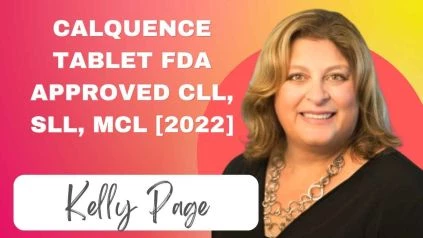Calquence Tablet FDA Approved CLL, SLL, MCL
Can You Tell Us The Significance Of The FDA’s Approval Of Calquence?
The new Calquence tablet formulation provides an oral treatment option for physicians to consider for their patients in the US for chronic lymphocytic leukemia, small lymphocytic leukemia and patients with mantle cell lymphoma who have received at least one prior treatment option. Twenty to forty percent of patients with hematologic malignancies receive a gastric reducing agent, of which 70% of those are proton pump inhibitors (PPIs).
Now, patients on a proton pump inhibitor can receive Calquence without having to change their gastric acid-reducing agent. And this simplifies the treatment for both patients and physicians. So the tablet formulation offers an opportunity to provide Calquence to more patients in the US for whom it was not previously an option but who may benefit.
What Data Supported The FDA Approval?
The approval of the Calquence tablet (formulation) by the FDA was based on bioequivalence and bioavailability results of phase 1 studies of the ELEVATE-PLUS analysis. The ELEVATE-PLUS analysis included three phase 1 open-label, single-dose crossover studies in healthy patients. The analysis demonstrated the bioequivalence between the Calquence tablet and the Calquence capsule.
It was established that the two had comparable efficacy and safety with the same dose strength and schedule. The majority of the adverse events that were observed in the studies were mild in intensity, and no new safety concerns identified.
What’s The Difference Between New Calquence and the Existing Capsule?
With a Calquence capsule, concomitant; proton pump inhibitor use is avoided. The new Calquence tablet formulation can be co-administered with gastric acid-reducing agents, including PPIs and acids, and H2RAs based on the US prescribing information.
Why Is It So Important For Patients To Have An Option?
Patients with blood cancers, like mantle cell lymphoma and chronic lymphocytic leukemia, are often older and face multiple medical conditions, including acid reflux and peptic ulcers. So these patients (that face multiple medical conditions) are typically prescribed PPIs to prevent stress ulcers, and concomitant administration of PPIs with Calquence capsules was not recommended because it reduced the exposure of Calquence.
The new Calquence tablet formulation will allow healthcare providers to co-administer Calquence with gastric acid-reducing agents now, including PPIs along with antacids and H2RAs.
 Is the Tablet Replacing The Current Capsule?
The goal is to transition patients who are currently receiving capsules to tablets at a time that is in consultation with their physicians.
What Is The Efficacy and Safety of the Calquence Tablet?
The ELEVATE-PLUS analysis showed comparable efficacy and safety can be expected between the two formulations so Calquence in a tablet form enables physicians to prescribe a treatment with established safety and efficacy and addresses an important administration barrier that allows the medicine to be co-administered with gastric acid-reducing agents, now; including proton pump inhibitors.
What Is The Recommended Dose For The Calquence Tablet?
The tablet has the same 100-milligram strength and is recommended oral twice-daily dose regimen as the capsule. The main difference is the co-administration with all gastric acid-reducing agents, including proton pump inhibitors, antacids, and H2RAs.
Is The Tablet FDA Approved for CLL, SLL, And R/R MCL Patients Now?Â
On August 5th, 2022, the FDA approved the Calquence tablet formulation for all the current indications. That includes adult patients with chronic lymphocytic leukemia (CLL) or SLL and adult patients with mantle cell who have received at least one prior therapy. The Calquence tablet is now commercially available through specialty distributors in the US.
What’s Next For The Tablet?Â
We are in discussions with regulators around the world to enable the availability of the tablet for patients.
Final ThoughtsÂ
At AstraZeneca, we are committed to improving the lives of cancer patients. The introduction of the Calquence tablet allows us to better serve physicians and patients by simplifying the prescribing of Calquence by removing the PPI restriction and hopefully improving the care of patients who are on Calquence.
Kelly Page – About The Author, Credentials, and Affiliations
Kelly Page is the Vice President, and Global Commercial Head – Hematology at AstraZeneca.
AstraZeneca is a multinational, science-led biopharmaceutical business focused on prescription medicine research, development, and commercialization.
Calquence (acalabrutinib) tablets from AstraZeneca have been approved in the United States for all current indications, including adult patients with chronic lymphocytic leukemia (CLL), small lymphocytic lymphoma (SLL), and relapsed or refractory mantle cell lymphoma (MCL), which is approved under accelerated approval based on overall response rate.

